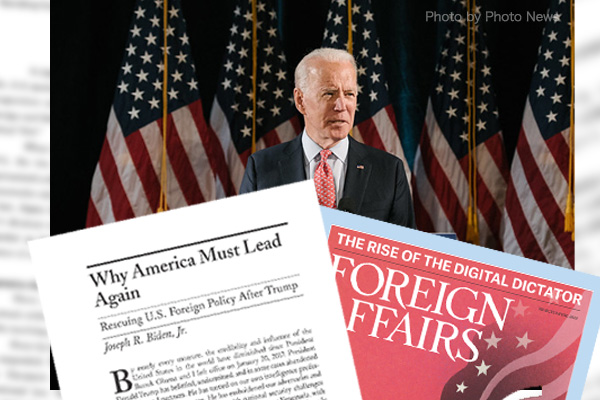It is too timeworn to follow media’s year-end practice of selecting and commenting on the world’s 10 biggest news events of the past year. If I were to select only the biggest news event for the year, I would like to cite Democrat candidate Joe Biden’s victory in the U.S. presidential election. Every American friend of mine I met during the campaign asked if I like or hate President Donald Trump. I read liberal newspapers criticizing Trump. But I still wonder if American voters selected the new president based on an accurate analysis of the international situation.
Is Summit for Democracy a move to 2nd U.N.?
Anyway, the Biden administration coming into being in early 2021 is preparing to create a new framework for the postwar international order. In the March/April 2020 issue of Foreign Affairs magazine, Biden promised to convene a “Summit for Democracy” within one year after his inauguration as U.S. president. Why? Because the United States should lead the world again, Biden said.
For more than 40 years since the end of World War II till the end of the Cold War, the United States proudly flew the flag of liberal democracy, with its presidents shining. When the Cold War ended, an age of the U.S.’ unipolar domination in the world was thought to have come. But such expectations were disappointed soon. Some major powers rose, and others fell. International institutions created at the initiative of the U.S. after World War II to stabilize international order -- the United Nations, the North Atlantic Treaty Organizations, the International Monetary Fund, the World Bank, the World Trade Organization, the World Health Organizations and others – have become unable to play their roles.
Biden’s idea might have been shared by the late U.S. Senator John McCain who proposed during the 2008 presidential campaign as the Republican candidate to create a League of Democracies apart from the U.N. McCain called for reviving the U.S.’ international prestige and harshly criticized China and Russia. He felt desperately uncomfortable with the two countries that joined and benefitted from the postwar international institutions but vetoed any measure running counter to their national interests.
Biden’s “Summit for Democracy” proposal has not clarified how to separate democracies from others. Will the Philippines, Turkey, Poland, and Hungary be classified as democracies? Any wrong classification could trigger international conflicts.
And what roles will the Summit for Democracy play in the future international politics? If Biden intends to create a second U.N. comprising democracies alone as planned by McCain, confrontation between democracies and non-democracies could become conspicuous, sparking off a big change in the postwar international order.
New international order to test Japan
How should Japan engage with a new international order? The answer to the question is difficult to make because of great uncertainties. But Japan could no longer be allowed to remain complacent with believing that sticking to its status as what former U.S. presidential national security adviser Zbigniew Brzezinski called a de facto U.S. protectorate and keeping an outdated constitution intact would represent its wise foreign and national security policies. The year 2020 could be remembered as marking a watershed in Japan’s foreign and national security policies.
Tadae Takubo is Vice President of Japan Institute for National Fundamentals and a professor emeritus at Kyorin University.


